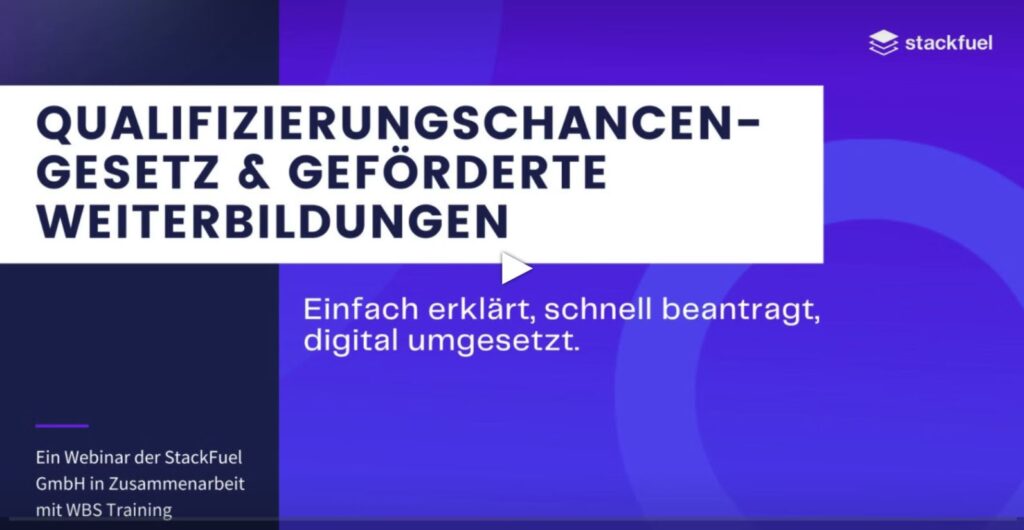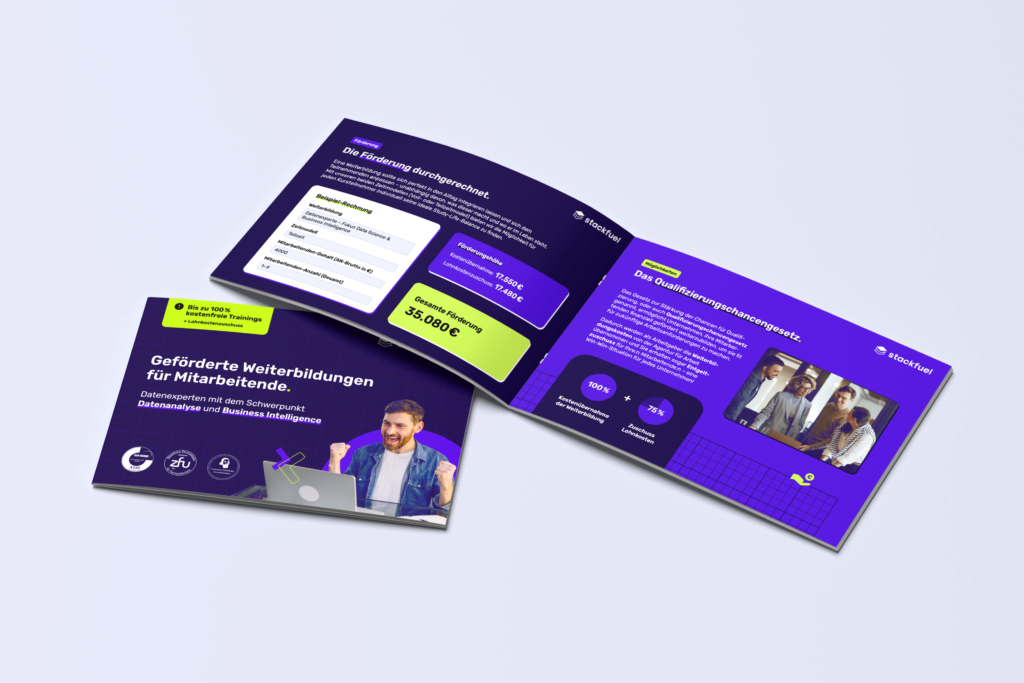Whether you are an employee or an employer, the Qualification Opportunities Act (QCG) supports anyone who wants to develop their skills in the digital transformation. The funding is aimed at people who are employed and subject to social security contributions and helps employers to make their workforce fit for new technologies. How you 2026 up to 100 % of the training costs and Allowances for wages and salaries you can find out here.
Promotion with the QCG: Opportunities in the digital transformation
The Qualification Opportunities Act, which came into force in January 2019, helps employees and companies to keep pace professionally in times of technological change.
The QCG is aimed specifically at anyone who is employed and subject to social security contributions and would like to complete further vocational training - regardless of whether the impetus comes from the employee or the company.
This also distinguishes the QCG from the education voucherWhile this is primarily intended to secure jobs or get unemployed people back into work, the Qualification Opportunities Act is geared towards employees and their employers. The Qualification Opportunities Act is aimed at employees who want to develop new skills in order to understand and apply new technologies and trends and at employers who want to secure or expand their position on the market with their team using new expertise.
As many industries will be more affected than ever by structural change in 2026 and the shortage of skilled workers will shape the world of work, further training in data, AI, IT and automation will become even more important.
"By 2025, around 1.3 million jobs will disappear due to automation and technological progress, but 2.1 million new jobs will be created at the same time. Our task is to ensure that the workers of today can also do the work of tomorrow",
declared Hubertus Heil, Federal Minister of Labor and Social Affairs, in a speech on the Qualification Opportunities Act.
Advantages of the Qualification Opportunities Act
- Qualification of staff without high additional costs
- Takeover of up to 100 % of the training costs
- Allowances for wages and salaries
- Relief for SMEs
- Broad, digitally oriented range of further training courses
- Employee motivation and retention
- Qualify staff in a cost-saving way
- Funding of up to 100 percent of further training costs
- Wage supplements
- A diverse range of further training courses
- Increase employee motivation
Subject areas for qualification via the Qualification Opportunities Act
Subject areas for qualification via the QCG
Funding is available for further training that Future-oriented competencies and go beyond what is necessary in the current job anyway.
Eligible are e.g:
- Data analytics, data science, AI
- Programming
- Automation & digitalization
- Technologies with high potential for change in the labor market
The promotion of the Qualification Opportunities Act is therefore not strictly limited in terms of subject matter. Even training courses for people who have not yet obtained a qualification are eligible for funding.
However, the focus is naturally on further training courses that focus on current digitalization topics and make employees and employers fit for structural change and new markets. The courses offered by StackFuel, for example, revolve entirely around the "data" megatrend and are eligible for funding under the Qualification Opportunities Act, for example as a Data Scientist or as Python Programmer.
Tip: Online further training can also be funded under the Qualification Opportunities Act! Book a free Consultation with us and find out about your options.
Scope of further training via the Qualification Opportunities Act
Scope of further training
QCG further training must be at least 120 hours include.
These can be completed flexibly over longer periods of time or in several modules.
Longer measures are particularly worthwhile: the funding can combine
- Costs of further training and
- Allowances for wages and salaries.
This means that vocational qualifications can also be obtained without financial disadvantages.
Qualification Opportunities Act: background, objectives and requirements
The Qualification Opportunities Act is part of the so-called Qualification offensive. On 1 January 2019, it replaced the previous WeGebAU program and created a broader range of funding for more people. In 2024, the current federal government amended the law once again and simplified access to funding. You can find out more about this below.
Objectives of the QCG
- Qualifying employees for digitalization & AI
- Avoiding unemployment through structural change
- Securing the skilled labor base
- Supporting companies with transformation processes
Prerequisites
The funding is aimed at people who:
- Employed and subject to social security contributions are
- one Future-oriented further training complete
- at least 120 hours invest
- have not completed any comparable further training within the last two years
- a AZAV-certified Select educational offer
Certification in accordance with AZAV means that the provider and offer have been tested and meet the requirements of the "Accreditation and Approval Ordinance for Employment Promotion". This also ensures the quality of the training.

What roles do employees and employers have in the promotion via the QCG?
In principle, any employee can initiate further training that is eligible for funding. However, only the employer submits the application at the employment agency or employer service.
Employers receive up to 100 % of the training costs reimbursed, employees receive Allowances for wages and salaries. So both sides benefit:
- Employees gain further qualifications without losing pay.
- Companies can develop personnel in a targeted manner without a major financial burden.
Not eligible for funding: Self-employed persons, managing directors without compulsory social insurance, trainees, mini-jobbers and employees in the public sector.
What costs are covered by the Qualification Opportunities Act?
The costs are covered on a staggered basis as part of the Qualification Opportunities Act. This means that companies with a large number of employees receive less funding per employee - but the total amount of funding can still be high. On this Graphic of the employment agency you will find the details.
- < 50 employees: up to 100 % of the training costs + allowance towards wages
- 50-499 employeesup to 50 % of the costs
- ≥ 500 employeesup to 25 % of the costs
- Further vocational training: always 100 % Promotion, regardless of the size of the company
The exact subsidy rates are determined by the Federal Employment Agency defined.
Tip: If you want to develop yourself professionally and acquire knowledge on the mega topic of Data Science you can have this promoted with the Qualification Opportunities Act. Your boss will like that too!
QCG-Applying for funding: How to apply via the employment agency
Employees must themselves no application place.
Your task: To convince the manager or HR department of the need for further training.
The employer then submits the application to the Employment Agency in.
The simplifications in force since 2024 ensure that:
- Applications are shorter and clearer
- Collective applications for several employees are possible
- Decisions can be made more quickly
The questions include:
- Age, education and any restrictions
- Company size
- Duration and scope of the measure
After approval:
- The training must start within 3 months
- Employees receive their regular salary
- Full-time or part-time is possible
Successful thanks to QCG: All the steps to promotion
Only a few steps are necessary to receive funding under the Qualification Opportunities Act.
We summarize the most important ones:
- Research the training program that suits you and can make you fit for the future.
- Discuss your wish with your supervisor and point out the possibility of having up to 100 percent of the costs and your salary subsidized.
- Your employer can now apply to the Employment Agency for funding under the Qualification Opportunities Act.
- Once funding has been approved, further training must begin within three months.
- You will continue to receive your salary during your training.
It does not matter whether the training is full-time or part-time. What is important is that it covers at least 120 hours in total.
Who can advise me on QCG funding?
There is a wide range of advice on the Qualification Opportunities Act. The most obvious one for employers is the Employer Service of the Employment Agency. However, many training providers themselves also offer advice and contribute their experience in dealing with funding bodies.

Tip: StackFuel also offers a free of charge Consulting for companies to support measures, as well as for Employees.
Change to QCG 2024: Please note!
As mentioned earlier in the article, the federal government did not amend the Qualification Opportunities Act until 2024 in order to better meet the requirements of the labor market. This means:
- More further training measures are supported.
- The application process has been simplified.
- A larger share of the wage costs is covered.
- The scale of company size has been adjusted, which benefits small companies in particular.
- The waiting period for funding has been reduced to two years.
- The new qualification allowance covers a fixed part of the salary of the employee undergoing further training.
The amendment to the Qualification Opportunities Act therefore enables employees to undertake further training more frequently and makes it easier for employers to access funding.
QCG funding in NRW, Bavaria & Co: What do I need to consider regionally?
As the Qualification Opportunities Act is a federal law, the funding guidelines are regulated uniformly in all federal states. Although applications or processes may differ in detail in the respective employment agencies, the funding amounts and rules are the same nationwide. The employer services of the regional employment agencies are also responsible for funding decisions in all federal states.
Nevertheless, there are differences in further education funding between the individual federal states: The federal state of North Rhine-Westphalia, for example, still had its own state funding scheme called Bildungsscheck until June 30, 2024. The federal state of Bavaria operates its own further education portal "Come on"where you can find comprehensive information on regional and national support and advice services.
Further training via the Qualification Opportunities Act (QCG): Free webinar
As accessible and comprehensive as the Qualification Opportunities Act is: Unfortunately, in the day-to-day life of an HR manager or managing director, further training topics also get lost. Yet there is great interest in funding opportunities, which are also relatively easy to apply for.
In our 23-minute Webinar on the Qualification Opportunities Act you will therefore receive all the important information in an easily accessible format. The webinar is available at any time and can be accessed without registration.

In this webinar, expert Ulrike Hullmann answers the following frequently asked questions:
- What changes does the QCG bring to professional development funding?
- What does the funding cover in detail?
- What are the general eligibility requirements?
- How can I apply for funding?
Further information on the QCG 2026
Further information on the Qualification Opportunities Act can of course be found at the Employment Agency or the Federal Ministry of Labor and Social Affairs.
However, you can reach your goal faster with a free consultation for employers and employees from StackFuel. Simply register for a free consultation appointment or recommend the offer to your boss.









